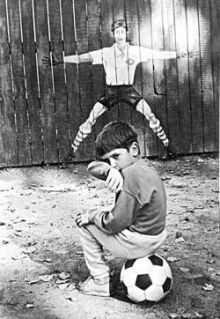Nearly two months have passed since Ukraine and Poland won the bid to host the final tournament of the European soccer championship in 2012. Last Friday, the Ministry for Regional Development and Construction of Ukraine convened the first meeting of mayors and other high-ranking officials of Kyiv, Donetsk, Dnipropetrovsk, Kharkiv, Odesa, and Lviv, the cities where the championship games will take place. The meeting was held in order to discuss preparations for the championship and report to Prime Minister Viktor Yanukovych on the current state of affairs. As the prime minister himself said, political reversals prevented this meeting from being convened earlier.
“Since the president is the head of the Euro-2012 coordinating committee, we are going to draw up proposals for a joint decision,” Yanukovych said. “We will reconvene after a meeting with the president and decide on a body that will be directly responsible for the preparations for the soccer championship. This will be a governmental agency, perhaps a department; a deputy prime minister will be vested with the necessary rights and powers. In addition, several ministries, especially transport and communications, finance, and youth and sport, will have special desks to deal exclusively with these matters.”
The prime minister said that he is totally unsatisfied with the state of readiness for the Euro-2012 in strategic cities, with Kyiv and Odesa receiving the brunt of his criticism. But he praised Lviv, which “came with serious plans and is very well prepared.”
During the discussion the president of the Soccer Federation of Ukraine, Hryhorii Surkis, presented the road map “The Euro Is Going East,” part of the soccer tournament preparations. The document contains information on such crucial components as funding, manpower, the list of main events, laws that need to be passed, a concept of hotel construction and accommodation in the cities that will be receiving guests, and the entire infrastructure, such as airports, hotels, hostels, medical establishments, stadiums, etc. According to Surkis, six volumes of these materials have already been submitted to UEFA. In Ukraine, this document will be assessed by a special government commission.
So far, the road map has come under criticism from Donetsk Oblast Council Chairman Anatolii Blyzniuk, who noted that the document does not mention another important event, the Euro-2009 youth championship, to be held in Donetsk and Mariupil. This should also be treated as part of the preparations for Euro-2012.
There was also criticism from Ivan Fedorenko, head of the Euro-2012 executive committee. “We have not taken a single step towards this important event. Most regions have not created any institutions that would be responsible for this work: as a rule, responsibility is being placed on regional departments of physical culture and sport. The worst thing is that I have not heard a single word from city mayors about how they are going to organize leisure activities for visiting fans,” he said.
Ukraine’s soccer committee chief means that the championship month can be divided into hours: the game will take up 64 hours, sleep will take 196, but nobody knows how the remaining 412 hours will be filled. Fedorenko noted that about 600,000 soccer fans are expected to arrive in Ukraine. So he wants to know: how will these foreign guests occupy themselves for the more than 400 hours when they will not be sitting in a stadium? He stressed that the entertainment infrastructure is no less important than good roads, the availability of hotel rooms, or customs fees.
So far, hardly anyone has broached these subjects. This is easy to understand because roads remain by far the worst headache in Ukraine. The problem of roads was raised by Vira Ulianchenko, head of the Kyiv Oblast Administration. She suggested that the government pass a decision on building a large ring road around the capital to reduce the number of traffic jams.
The overall impression is that the preparations for Euro-2012 are like major repairs being done in a hurry: everything requires attention and everything is important. But no one is panicking: there is a lot of time.
The preparations will be widely covered in the media. Prime Minister Yanukovych has promised that Ukraine’s State Committee for Television and Radio will help make a documentary on regional preparations for the soccer championship. That would be good, as long as politics do not stand in the way.







